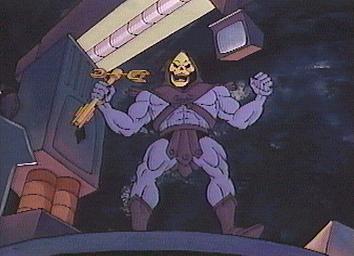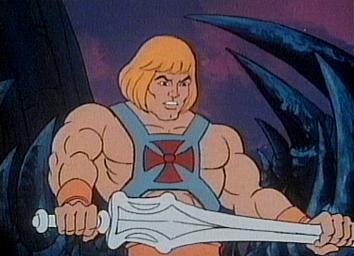
- by Owen Morton
It's never actually occurred to me until now how similar Eternia, the planet on which that programme of sheer genius, He-Man and the Masters of the Universe, was set, is to the USSR. In fact, this hasn't really occurred to me now, but I thought the above title was pretty cool, so I'd write an article which would justify using it. And thus the arguments I'm about to use are perhaps rather tenuous and even downright wrong. This will be due to my lack of knowledge on the subject of either He-Man or the USSR, or probably both.
I should like to start with a quote from V. I. Lenin's 'The State and Revolution': "the oppressed are allowed once every few years to decide which particular representatives of the oppressing class shall represent and repress them in parliament!" This clearly gives us Lenin's view on the bourgeois democracies of the late 19th century. Unfortunately, I don't think it's remotely relevant to this article.
Here is my first point in comparing Eternia to the USSR: despite the fairness and niceness displayed in He-Man by the royal family towards any and all visiting peasants (even if, as was usually the case, they turned out to be Skeletor or one of his more intelligent lackeys in disguise), the point cannot be avoided that Eternia was still a class-driven system. King Randor and Queen Marlena, as well as the insufferable Prince Adam, lorded it over the peasants. I can't think of an example of an episode in which they did this, but don't worry, they did, even though they were supposed to be fair rulers. And can anyone see where I'm going with this? Yes, in the USSR, everything was supposed to be fair, and it wasn't. The peasants again were exploited by the upper class i.e. the people who were in charge, by which I mean you, Comrade Stalin. The only real difference is that on Eternia, they clearly hadn't yet worked through the feudal stage, so the peasants were actually in their proper place by being repressed. In the USSR, there was no excuse. Consider yourselves warned. If it happens again, Comrade Stalin, I shall be very cross.
And at the end of that rather unclear and disjointed paragraph, I will confess I'm rather stuck to come up with another point. What about this? In the USSR, at least in principle, money wasn't used. On Eternia, as far as I recall, money wasn't used. No, okay, I will admit that that was a bit of a stretch. In that case, I will here change the direction of the article and attempt to theorise how Eternia might have developed in time according to a Marxist interpretation of history.
Marxist theory (as far as I have been told, though I haven't personally ploughed through 'Das Kapital', on account of it being incomprehensible) suggests that history is influenced primarily by economic change, and works through four distinct phases: feudalism, capitalism, socialism and communism, which is the natural conclusion of history. Feudalism is a system whereby the peasantry is exploited by the aristocracy, and is also a word which has all the vowels in it bar one (guess which). Money is not, as a general rule, used, barter being the more usual system of exchange. Eventually, feudalism gives way to capitalism because of the rise of a middle class who eventually manage to earn more money than the aristocracy (I think that's how it works). This middle class is called the bourgeoisie (which is another word with all the vowels in it, bar one, but bar a different one than in feudalism), who exploit the working class. Eventually, the working class get very cross about being exploited and rise up against their exploiters. They overthrow them and set up a system called socialism. Under socialism, everyone works as hard as they can and is given all they need to survive. This evolves gradually and naturally into communism, which is basically the same, but I think the primary difference is that in communism, everyone is so good that they take what they need, instead of being given it, and no one takes more than they need. At this point the state withers away and everyone is happy.
So that's what happens on Earth (apparently, though personally I don't see it happening, unfortunately). But what happens on Eternia? Let's try to put it into the context of a He-Man episode, shall we?

My idea would be that somehow, Skeletor and his minions would become the bourgeois middle class who surpass the royal family in earnings, so they are the effectual controllers of Eternia. Then, of course, as would naturally happen, Skeletor and co. would exploit the peasantry (or, as we should now properly refer to them, the working classes or even, if we wish to be very Marxist indeed, the proletariat). Fortunately, some hero of the proletariat, probably He-Man (even though he is Prince Adam in another form and thus a member of the aristocracy - I think he can be excused though on the basis of, when he is He-Man, not technically being part of the royal family) would revolt against Skeletor, write Eternia's version of 'The State and Revolution', probably entitling it 'How To Defeat Skeletor And The Rest Of The Bourgeoisie With One Easy Punch' and then set up the equivalent of the USSR, probably calling it the UESSR (guess what that stands for. If you can't, then it's Union of Eternian Soviet Socialist Republics).
But this is where everything would become radically different from how things developed on Earth. As those of you who have even the most cursory knowledge of events in Russia in the 1920s and 1930s will know, the Marxist vision of socialism and communism didn't really materialise. I think this can be chalked up, at least partly, to the death of Lenin. But on Eternia, since He-Man has taken on Lenin's mantle, this unfortunate event wouldn't happen, at least not so soon. He-Man is in the prime of health, so he wouldn't die from a stroke within seven years of seizing power from Skeletor/the bourgeoisie. But even if he did, it is unlikely that history on Earth would have developed in the manner it did had that psychopathic evil treacherous betrayer of the great and good principles displayed in 'The State and Revolution' (sorry if I'm coming across as a little biased here) Stalin not managed to achieve power. Thus, if He-Man died seven years after the Revolution and we wanted history on Eternia to develop in the same way as it did on Earth, we would need someone who appeared to be one of He-Man's communist allies who would then betray the principles of He-Man's Revolution. But I bet you can't think of anyone who'd be a candidate for doing this, can you? Who would betray the Revolution? Orko? Man-at-Arms? I honestly don't think so. Besides the fact that they're so inept that any attempt they made to betray the Revolution would be inevitably bungled, what possible motive could they have for doing so? They never seem particularly ambitious for power, do they? The only person I can think of on the side of the Good Warriors who might potentially make a bid for power is the Sorceress, but I don't think she would really, considering that she could do this at any time during the series and probably succeed, yet doesn't.

So on Eternia, the UESSR would develop along the lines dictated by Marx, under the tender loving care of Comrade He-Man, as opposed to on Earth, where it all went wrong. Just think how different history would have been if He-Man had been the leader of the 1917 Revolution instead of Lenin! He'd have managed to get communism spread all over the world, and it would have been true communism, not the in-name-only-communism that Stalin instigated in Eastern Europe after World War II. In fact, let's take it further and point out that there probably wouldn't even have been a World War II if He-Man and not Stalin had been in charge of the USSR in 1939. I mean, can you see He-Man signing a non-aggression pact with Hitler? Especially one with a secret protocol to divide Poland between them? No? I rest my case.
And at the end of this interesting political speculation, I will leave you to think about all the important points I've raised.